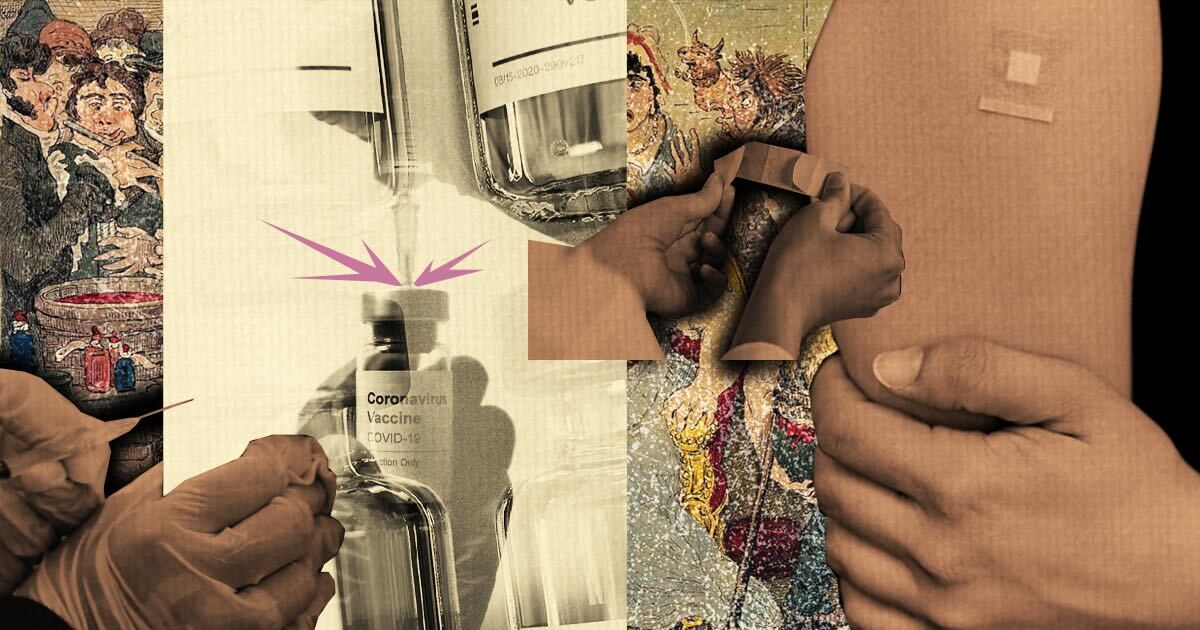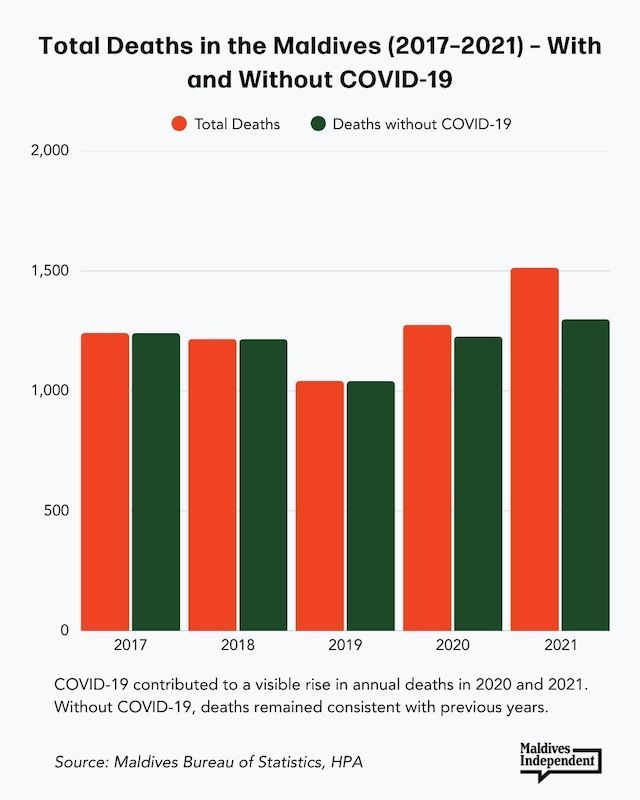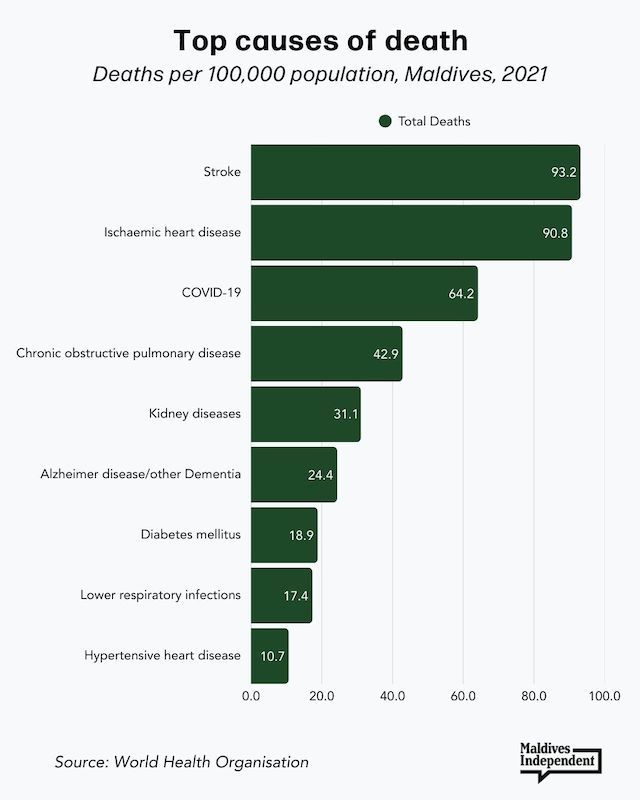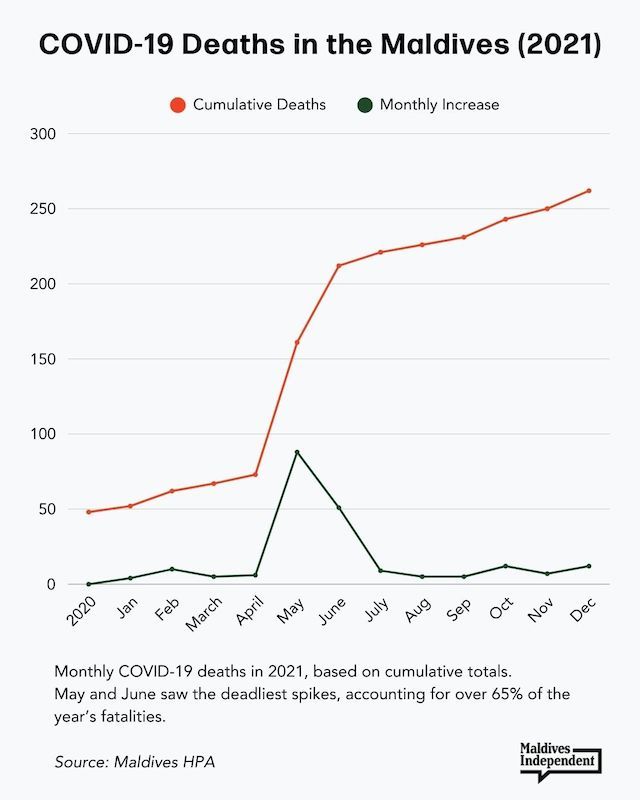Maldives confronts vaccine skepticism amid concern over young deaths
Cardiovascular disease is the real killer, doctors say.

Artwork: Dosain
25 Mar 2025, 17:00
The Covid-19 pandemic indelibly reshaped Maldivian society. Five years after the first cases were detected, the ripple effects continue to be felt in unexpected ways.
One of the more troubling legacies of the emergency response has been the birth of a vaccine skepticism movement that has plagued social media discourse, eroded trust in medical authorities, and potentially threatened decades of public health progress.
"Vaccines save lives. Covid vaccines saved a lot of lives. We know that because the number of hospitalisations and severe cases went down dramatically post-vaccination,” a senior pediatrician told the Maldives Independent.
“We know vaccines save lives because we have eradicated or controlled some of the most deadly diseases we have seen.”
But the growing skepticism could undermine these hard-won achievements such as high childhood immunisation rates that have helped eliminate polio and measles.
Despite overwhelming scientific evidence on safety and effectiveness, every sudden or unexplained death of a young Maldivian since the rollout of the Covid-19 vaccines now becomes the latest flashpoint in a contentious online debate over vaccine safety.
The untimely death of a 43-year-old man last week renewed hostilities between defenders of medical science and skeptics who attribute such deaths to the Covid-19 vaccine.
One commentator in particular would have been unmissable on Maldivian social media spaces. A persistent critic of the immunisation effort, Shifan Ahmed rapidly and reliably appears whenever the Covid-19 vaccine is mentioned.
But Shifan objects to his description as an anti-vaccine activist.
"As you would know, anyone who questions the safety issue of vaccines, such a person gets labelled as anti-vaccine. It is supposed to be a pejorative to silence dissent to Big Pharma," he told the Maldives Independent.
Shifan recounted how his journey to vaccine skepticism began from a newborn in the family experiencing medical complications six years ago. “Since then I have done so much research, read scientific studies and official documents that I have nothing in vaccines that I could trust," he asserted.
What started with Google research morphed into an all-consuming passion, submitting right to information requests to government agencies, mounting legal challenges, writing lengthy blog articles and self-funding to boost his social media posts.
"I spend much of my day and almost every day, researching and doing advocacy work. My advocacy is to raise awareness about our right to life and bodily autonomy; as guaranteed in article 22 of our constitution," he said, referring to the “right to life, liberty and security of the person” and contending that vaccination campaigns violate this right.
"It is an advocacy for informed consent rights and bodily autonomy," he added.
Shifan made several claims about the dangers of the Covid-19 vaccines, including positing a correlation between a supposed twofold increase in deaths in the first six months after the nationwide vaccination programme started in February 2021.
But Shifan’s numbers were based on data that he compiled himself.
Facts and statistical reality
Official data from the Maldives Bureau of Statistics suggest Shifan’s figures are either false or fail to provide adequate context. In 2020, the Maldives recorded 1,275 deaths, which was followed by 1,513 deaths in 2021, an 18 percent increase.
Accounting for 214 out of the total 316 Covid-19 deaths, 2021 was the deadliest year of the coronavirus pandemic for the Maldives. The rise in deaths during the year can be attributed to Covid-19 fatalities as the death toll climbed from 48 in 2020 to 262 by the end of 2021. The majority of these deaths were reported in the first half of the year.
When the Covid-19 deaths are taken into account, there is no significant increase in the number of deaths in 2021 when compared to 2020.

The Maldives was lauded for the inoculation effort launched in early 2021, which offered free vaccination to all residents, including undocumented migrant workers, and completed two doses for 85 percent of the adult population by August 2021.
But the reality is that like any medical treatment or medicine, vaccines do carry risks, however minimal or rare. The AstraZeneca/CoviShield vaccine donated by India to the Maldives was linked to a rare but serious blood clot, leading to restricted use and ultimately withdrawal as demand shifted to other vaccines when new variants emerged. The Moderna and Pfizer vaccines have been linked to rare cases of heart inflammation, usually without long-term damage. Acknowledging these legitimate concerns is crucial for maintaining public trust, according to health experts.
On Monday, the state broadcaster sought to address genuine public concerns over the sudden deaths of young people. Up to 70 percent of deaths are now caused by cardiovascular diseases involving the heart or blood vessels, a doctor explained.

Myths and misinformation
Many of the other claims that Shifan made to the Maldives Independent regurgitated online misinformation – such as the alleged use of preservatives or aborted foetal cells as vaccine ingredients affecting fertility and altering DNA in addition to exaggerations about the real side-effects – all of which have been thoroughly debunked.
Extensive data from vaccination campaigns and active monitoring across multiple national agencies and the World Health Organisation have been conclusive about the safety and efficacy of the Covid-19 vaccines, which prevented serious illness, hospitalisations and an estimated 20 million deaths worldwide.
"The public health perspective is clear. Covid vaccines are safe and effective and the benefits far outweigh the rare occurrences of severe side-effects. To be frank, the pandemic would have gone unchecked without the swift rollout of the vaccine. It would be a different world right now," a senior public health official told the Maldives Independent.
Dr Nazla Mustafa, a sub-specialist in pediatric infectious diseases, explained how the benefits of the vaccines were weighed against the risk of the disease.
"Actually it's about the risk of getting infected with the Covid-19 disease versus Covid-19 vaccines. Covid-19 itself increases the risk of myocarditis [heart inflammation] and blood clots. New research is showing that for some years after a Covid-19 infection, the risk of heart attacks and strokes do increase," she told the Maldives Independent.
She described the reality that public health officials faced globally before the vaccines prevented severe cases and reduced the burden on overwhelmed hospitals.
"When Covid-19 was initially identified, people didn't have immunity to that variant. And the elderly and those with underlying conditions and others got very sick. This required admission in ICU and [resulted in] surges in hospitalisation. This not only affects those infected with Covid-19 but all other healthcare services, like treatment capacity for other infections, cancer or other serious illnesses," said Dr Nazla, a member of the 'Adverse Events Following Immunisation' committee at the Health Protection Agency.
Despite assurances from global health authorities and senior public health officials, vaccine hesitancy and distrust have been growing. According to a 2023 UNICEF report, confidence in vaccines dropped in 52 out of 55 surveyed countries.
Countering vaccine misinformation should be a priority, a senior official at a government-run hospital suggested.
But it is an uphill battle.
"How can you have a proper argument based on facts when the concept of a fact is distorted?” he asked. “We can talk about the latest data from WHO, CDC or other stringent regulatory agencies, but then, when there is a lack of trust in any of these established systems, how do you argue?"

Discussion
No comments yet. Be the first to share your thoughts!
No comments yet. Be the first to join the conversation!
Join the Conversation
Sign in to share your thoughts under an alias and take part in the discussion. Independent journalism thrives on open, respectful debate — your voice matters.

